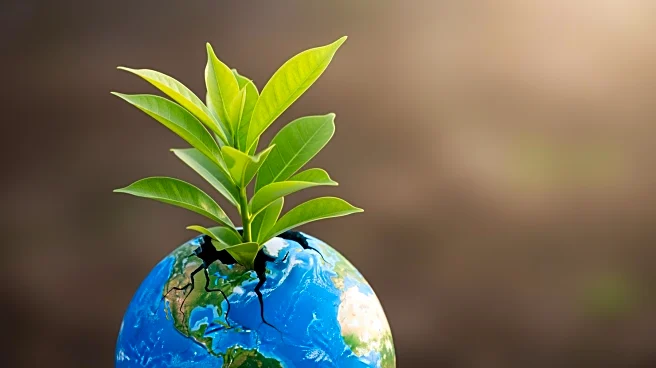What's Happening?
The 30th Conference of the Parties to the United Nations Framework Convention on Climate Change (COP30) commenced in Belém, Brazil, marking a significant moment as the conference is held in the Amazon for the first time. President Luiz Inácio Lula da
Silva emphasized the symbolic importance of hosting COP30 in the Amazon, highlighting the region's critical role in climate solutions. He outlined three pillars for the conference: fulfilling existing climate commitments, enhancing global governance, and prioritizing people in climate decisions. President Lula proposed the establishment of a Global Climate Council under the United Nations General Assembly to improve coordination and accountability among nations. The conference aims to transform commitments into concrete actions, addressing the urgent need to combat climate change.
Why It's Important?
COP30 represents a pivotal moment in global climate policy, as it seeks to transition from promises to tangible actions. The conference's location in the Amazon underscores the urgency of addressing climate change impacts on vulnerable ecosystems and communities. President Lula's call for a Global Climate Council highlights the need for stronger international cooperation and accountability. The outcomes of COP30 could significantly influence global climate governance, potentially leading to more effective implementation of climate agreements. The focus on integrating climate, economy, and development aims to create jobs, reduce inequalities, and build trust among nations, which is crucial for sustainable progress.
What's Next?
As COP30 progresses, delegates will work on turning climate commitments into actionable policies. The proposed Global Climate Council could become a key mechanism for ensuring accountability and coordination in global climate efforts. The conference is expected to foster new alliances and strengthen existing ones, with a focus on delivering concrete results. The discussions and decisions made at COP30 will likely influence future climate policies and initiatives, impacting both developed and developing countries. Stakeholders, including governments, businesses, and civil society, will be closely monitoring the outcomes to assess their implications for global climate action.
Beyond the Headlines
Hosting COP30 in the Amazon brings attention to the ethical and cultural dimensions of climate change, emphasizing the need to protect Indigenous communities and biodiversity. The conference could lead to long-term shifts in how climate policies are developed and implemented, prioritizing inclusivity and equity. The focus on combating misinformation and upholding scientific evidence highlights the importance of addressing climate denialism and promoting informed public discourse. COP30's emphasis on implementation may set a precedent for future climate conferences, encouraging a more action-oriented approach to global climate challenges.
















